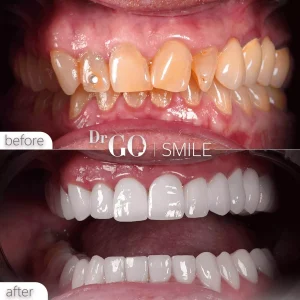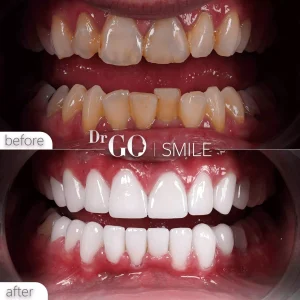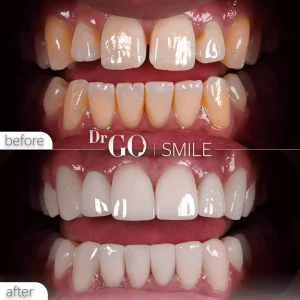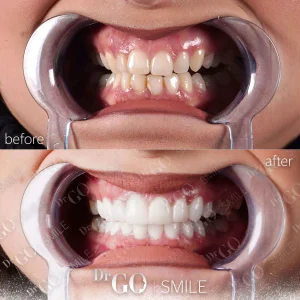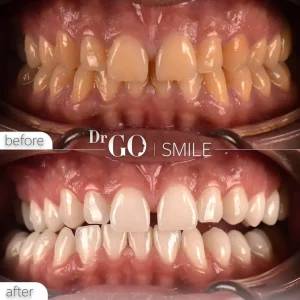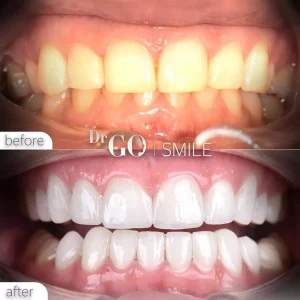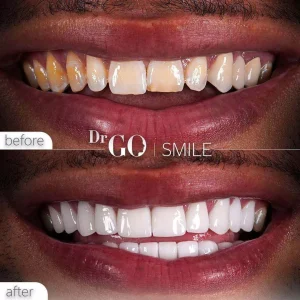
Who Needs Veneers?
What is a Veneer and What Dental Problems Does It Address?
A veneer is a very common cosmetic dental treatment designed to improve the appearance of your teeth. Anyone wishing to correct discoloration, cracks, chips, or misaligned teeth can opt for veneers. By placing these shell-like layers on the front of your teeth, you can fill in gaps between teeth or enhance the overall appearance of your smile, making it a perfect alternative for those looking to enhance their smiles. In this blog post, we’ll cover everything you need to know about veneer treatment, including what veneers are, who needs them, where to get them best, and how they’re applied.
Definitive Guide to Dental Veneers in Turkey: Expectations, Treatment Sequence, and Post-Treatment What to Expect
- Because veneers are a permanent treatment option, it’s important to consider the risks and outcomes before deciding on them.
- Since veneers are custom-made to match the shape and color of your natural teeth, it’s important to have reasonable expectations about the result.
- Since part of the tooth enamel needs to be removed before placing veneers, it increases the possibility of tooth sensitivity.
- Veneers can break or become damaged if not properly cared for, as it’s important to follow good oral hygiene practices.
- The cost of veneers varies widely depending on the type of veneer and the location of the dental clinic, so it’s important to get information from your dentist about the cost and financial alternatives before starting treatment.
How Veneers are Placed and Attached: Step-by-Step Guide
Placing veneers requires two appointments. The first appointment involves preparing your teeth for veneers; during this time, a small amount of tooth enamel is removed and then an impression of your teeth is taken to send to our dental laboratory. The laboratory will create your veneers to perfectly fit your teeth. At your second appointment, the veneers are placed on the teeth and bonded into place.
During this treatment, a small amount of your tooth’s enamel surface is removed, which can cause mild sensitivity to very hot and very cold beverages. Veneers are not suitable for individuals with extensive decayed teeth or gum disease.
Once veneers are placed, they do not move. If color matching is not achieved or they are not placed properly, they can result in undesirable outcomes and an unnatural appearance.
Tooth Preparation: Depending on the type of veneer that suits you, we may need to remove a portion of the tooth enamel to make room for the veneers. (Except for Lumineers, as they may not require tooth preparation.)
Tooth Impression: After preparing your teeth, we will take an impression of your teeth to produce a custom veneer for you.
Temporary Veneers: While the actual veneers are being made, we will place temporary veneers to protect your teeth.
Bonding: Once the permanent veneers are completed, we will remove the temporary veneers, place the specially made veneers on the teeth, and evaluate fit and color matching.
When the veneers are in the proper position, they will be bonded to the teeth using special dental cement.
Cost of Veneers in Turkey: Factors Determining the Price
Veneer treatment is a more economical option in Turkey compared to many other countries. It is a quite affordable alternative for many people who cannot receive the same quality of service in their own countries. In Turkey, on average, porcelain veneers cost between $925 to $2,500 per tooth, while composite veneers cost between $250 to $1,500 per tooth. However, the cost can vary greatly depending on the location and clinics. The cost of veneers also depends on the number of teeth that need correction. The more teeth need correction, the higher the total cost will be.
Safe and Reliable Dental Veneers in Turkey: Why Choose Us?
Dental centers in Turkey are considered quite safe for veneer treatment because the Turkish dentists who provide this specialized treatment are highly educated, certified, and experienced throughout the country.
Advantages of Choosing Veneers in Turkey
We have international accreditations and certifications and meet high maintenance and safety standards.
Additionally, we are located in Istanbul, the health tourism center of Turkey, and have a dental health center with advanced facilities and equipment to ensure the safety and comfort of patients. Our clinic houses the most advanced equipment and practices. We ensure that the procedure is performed correctly and that the veneers look natural and last for a long time.
F.A.Q. on Veneers treatment
Am I a Good Candidate for Veneers Treatment?
- Teeth that have been chipped or fractured
- Teeth that are gapped or misplaced
- Teeth that are stained or discolored and do not respond to whitening procedures
- Teeth that are worn or uneven
- Teeth with irregular shapes
If you have any of these problems, veneers may be a viable solution for you. Keep reading our post to learn if veneers is viable appropriate solution for you.
Painless Veneers: What to Expect During the Procedure
Veneers are not seen as a painful or uncomfortable operation; rather, they are regarded as a low-pain technique. Local anesthetic will be utilized to numb the area, reducing any discomfort and pain, however you still may feel tooth sensitivity after the operation which will not last very long. Overall, the veneer treatment is not considered unpleasant and the patient can anticipate to resume regular activities as soon as the anesthesia wears off.
Risks Associated with Veneers Treatment and How to Avoid Them
Veneers do have some risks and adverse effects, which include:
- The tooth preparation process prior to veneer placement will result in the permanent removal of a tiny piece of tooth enamel. This could result in tooth sensitivity or weakening. When the tooth enamel is gone, the tooth becomes more prone to sensitivity and might require more care.
- Veneers are applied to the existing tooth and may cause complications if the underlying tooth developed decay or gum disease.
- If veneers are not properly installed, they might chip or become loose and must be replaced.
Durable and Natural-Looking Veneers: What are They Made Of?
When it comes to dental veneers treatment many dental patients go for porcelain veneers. One of the reasons they are so common among dental patients looking to get brighter look is that they have more natural-looking appearance and more durability. It works by attaching a thin coating of porcelain to the front face of your tooth. If they are done well and properly cared going to be durable for 10 to 15 years.
Composite veneers are made of tooth-colored resin and are placed directly to the tooth surface. They cost less than porcelain veneers and may be finished in a single visit. They are, however, less durable than porcelain veneers and you may need to replace them sooner.
Lumineers are ultra-thin porcelain veneers that are put over the natural teeth without removing any teeth material. They may be a solution for people who have minor tooth misalignment or discoloration.
Temporary veneers are such veneers are not permanent, but they are an excellent choice for patients who want to see how veneers appear before deciding toward a permanent fix. They are typically made of resin and are readily removed.
How Long Do Veneers Last? The Truth About Their Longevity
With a lifetime of 10-15 years, porcelain veneers are said to be more resilient than composite veneers. Composite veneers, on the other hand, may last for 5-7 years. But you should keep in mind that you can make your dental veneers last only by keeping your oral care properly and getting regular dentist check-ups. Also prevent from biting hard objects, grinding, or clamping your teeth may help to increase the lifespan of your veneers.
Caring for Your Veneers: Tips for a Long-Lasting Smile
Caring for your veneers is crucial in ensuring they last for years to come. By following few simple tips and making your commitment to maintaining good oral hygiene, you can keep your dental veneers looking their best for many years.
- Start by brushing and flossing twice daily, just like you would normally do. with your natural teeth. It will help preventing any plaque or decay formation. Use a soft-brush to avoid damaging your veneers.
- Avoid any foods and habits that may potentially harm your veneers, like crunchy or hard foods. Don’t chew your nails, don’t ever open things with your teeth.
- Limiting your intake of coffee, tea, red wine, and smoking would help keeping the color clean. If you can’t avoid them, at least rinse your mouth with water after consuming them as this will help reduce staining.
Reversible Veneers: Can You Remove Them if You Change Your Mind?
Dental veneers are not a solution for every dental issue. They may not be suitable for every individuals, for example patients with certain oral health problems. A thorough consultation will determine if veneers are the right and preferable choice for you.
No Age Restrictions: Veneers Treatment for All Ages
Ultimately, the decision to get dental veneers should be based on your dental health, goals, and desires, rather than age. Regular oral care, both at home and with your dentist, is essential for preserving the longevity of your veneers.
How Much Does Veneers Treatment Cost in US, Canada, Europe and Turkey?
The cost of Dental Veneers treatment varies greatly depending about where you get it.
Getting veneers treatment for a pair would normally cost between $2,000 and $10,000 in US and $3,000 to $14,000 in Canada. In Europe, the pricing range is comparable, with pair costing between €2,000 and €14,000. In Turkey, the cost of Dental Veneers pair ranges from $600 to $2,000.
Cost is a significant issue, but you should always consider the quality of the treatment clinic provides first. and the competence of its dental professionals.
How much does veneers treatment cost in Turkey?
Cost of dental veneers treatment in Turkey ranges from $600 to $2,000 for a single pair.
Getting veneers treatment for a pair would normally cost between $2,000 and $10,000 in US and $3,000 to $14,000 in Canada. In Europe, the pricing range is comparable, with pair costing between €2,000 and €14,000. In Turkey, the cost of Dental Veneers pair ranges from $600 to $2,000.
Alongside of being a cost-effective option, it provides very affordable option for people looking to improve their look and smile in budged.
Additionally, state-of-the-art dental facilities are very common in Turkey and its tourism hub Istanbul.
Istanbul is full of experienced dental professionals and high-quality private dental clinics for dental patients.
It is important to research and compare the prices and services offered by various dental clinics in Turkey to make an informed decision.

